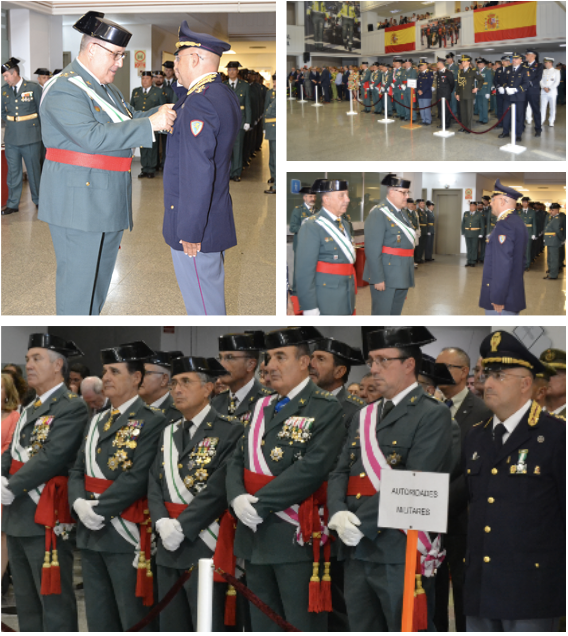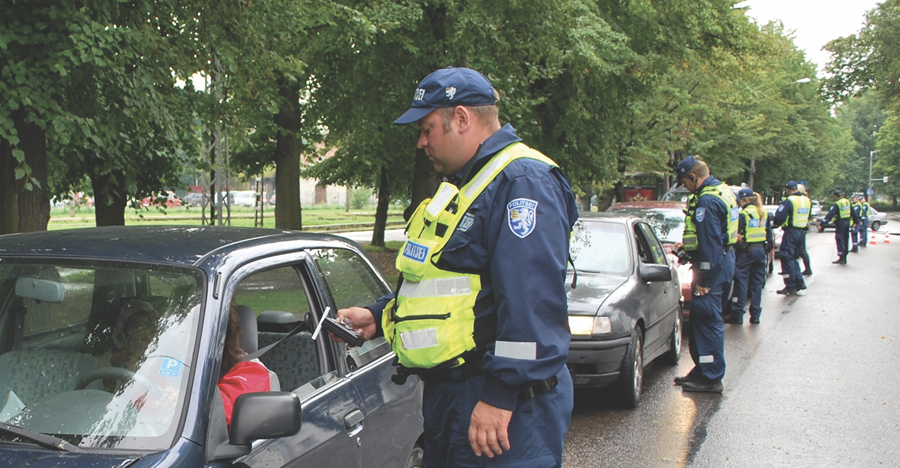
A proud moment for Paolo Cestra

TISPOL's
Honorary President, Paolo Cestra, recently received the Medal of
Spain's Guardia Civil at na ceremony in Madrid. Colonel of the Polizia
Stradale, Cestra has been the President of TISPOL for more than two
years, ending his term in April 2019. He is currently the Honorary
President. Throughout his term, he has been leading the Organization
brilliantly, maintaining this organization in which the Agrupacion de
Trafico de la Guardia Civil (Spain) is present, always active and
strengthened.
Among
these proposals that Cestra has supported, he highlights his active
participation in Operation Safe Holidays, an operation that
has been led by Spain. In this Operation, controls have been carried out
in Italian territory, aimed at drivers of North African origin that
circulate in the direction of Spain to cross the Strait, so that these
vehicles circulate safely and circulate through our territory with the
cargo well-conditioned. In addition, it has significantly promoted the
proposal, within the framework of Operation Safe Holidays, of the
commission of two components of the Polizia Stradale in Ibiza, where a
large number of Italian tourists spend the summer.
In
addition, it is considered that Cestra is also a creditor of this
distinction by the Guardia Civil, since this award would be making an
express recognition to TISPOL, in this case through its Honorary
President.
The
police cooperation that is represented in our case in TISPOL, not only
implies collaboration in the planning of campaigns or operational
coordination, but also must involve mutual recognition when
circumstances arise for it.
Also
he received the medal to the (Cruz del Mérito de la Guardia Civil), on
the occasion of the Patron of the Guardia Civil, because with this
medal, Guardia Civil distinguishes his work as President of TISPOL.
Therefore, coinciding with the end of his mandate at the head of TISPOL, the medal of Merit of the Guardia Civil
was granted on the occasion of official celebration of the Virgen del Pilar, Patron of the Guardia Civil.
The
medal was given by the General Ramón Rueda Ratón, Head of the
Agrupación de Tráfico of the Guardia Civil, on 10 October 2019 in
Madrid.
TISPOL's alcohol and drugs enforcement operation begins Monday 9 December

POLICE OFFICERS across Europe begin a week-long campaign on Monday 9 December
to raise awareness of the dangers of drink driving and drug driving.
The campaign is co-ordinated by TISPOL (the European Traffic Police
Network), and involves officers in all member countries conducting
alcohol and drug checks at any time of the day and night.
TISPOL
President Volker Orben says: “Driving after consuming any alcohol is
dangerous. Driving while over the drink drive limit is against the law.
Drivers will experience slower reactions, poor judgement of speed,
reduced co-ordination and concentration with much lower levels
of alcohol in their system.
“Taking
a chance and driving while under the influence of alcohol all too often
leads to a collision, often with grave consequences.
“It’s
also important to be aware of the continuing effects of alcohol the day
after an evening of drinking. Your body takes time to remove alcohol
from your system. If it is still present in your body, then it will be
identified during a breath test. That’s why a night’s sleep is no
guarantee that you’re safe and legal to drive the next morning.
The drug drive menace
Officers across Europe are particularly aware of the increasing frequency of driving under the influence of drugs, especially among young drivers. In many cases, they appear unaware of the dangers and trivialise their drug use. They fail to consider that their safety can be impaired a long time after they took a drug – sometimes more than a week later.
Officers across Europe are particularly aware of the increasing frequency of driving under the influence of drugs, especially among young drivers. In many cases, they appear unaware of the dangers and trivialise their drug use. They fail to consider that their safety can be impaired a long time after they took a drug – sometimes more than a week later.
“If
you have used recreational drugs, then do not drive,” urges Paolo
Cestra. “If you are taking medicine, whether prescribed or purchased
over the counter, then read the notes of advice that go with it. If
these tell you not to drive after taking the medicine, then do not
drive. The advice is there for a reason, to keep you and others safe.”
“If
you are in any doubt about medicines and driving, then our advice is to
consult a healthcare professional before you get behind the wheel.”
TISPOL’s messages this year remain simple:
- Your ability to drive safely is impaired by even a small amount of alcohol.
- No one else can force you to drive while under the influence of alcohol or drugs. It’s a choice you make, and we urge you to ensure you make the safe choice. So if you have had a drink, do not drive. If you need to drive, then do not drink.
- Don’t get into a car if you suspect the driver has been drinking alcohol or taking drugs. Instead, make a responsible decision and call the police immediately.
Drivers
can expect highly visible and widespread enforcement of alcohol and
drug laws during the operation, at any location and at any time of day
or night.
News from across Europe...
Bulgaria to receive extra funding for
road improvements
road improvements
Bulgaria
receive an additional 57 million levs ($32 million/29 million euro) in
EU funding under operational programme Regions in Growth 2014-2020 to
finance two road infrastructure projects, the regional development
ministry said.
The
government's Road Infrastructure Agency (RIA) will get over 55 million
levs which it will use to rehabilitate six road sections with a total
length of 134 kilometres, the ministry said in a statement last week.
Belgium: rise in drink driving
More
than one driver in 10 is driving on weeknights under the influence of
alcohol, more than twice more than fifteen years ago, the latest Vias
barometer published last week revealed.
Globally,
the percentage of drivers under the influence has reached 1.9%, an
identical figure to that of fifteen years ago. More than 6,100 drivers
were tested for the purposes of this barometer.
The percentage of drink drivers largely depends on
the time of the week. During the days of the week, an average of 0.4% of
drivers test positive; on weekend days, it is 1.2%. On the other hand,
these percentages rocket at night: more than one driver in 10 (10.7%)
drives while over the legal limit on weeknights and nearly one driver in
eight (12.6%) does so on nights over the weekend, Vias stated.
Poland: All Saints' Day weekend sees high fatality rates on the country's road
Despite
the prime minister's call for road safety before last month's All
Saints' Day holiday, 25 people were killed in 268 road accidents over
the long weekend, according to results published by the Polish police.
Just
prior to the weekend when most Poles travelled across the country to
join family and visit cemeteries where their dead are buried, Prime
Minister Mateusz Morawiecki issued
an appeal to Poles via his Facebook page.
"This
is a special time, when we realize how very valuable our lives are.
Let's remember that when we get behind the driver's wheel," Morawiecki
said in this two-minute speech.
In
2018, according to Morawiecki, 50 people died and 500 were wounded in
408 accidents taking place on Polish roads during the All Saint's
weekend.
Ireland: ‘Death is not the worst thing that can happen in road accidents’
People who sustained life-changing injuries speak at Christmas road safety campaign
The
Road Safety Authority and An Garda Síochána have called on all road
users to act responsibly and safely when using the roads throughout the
Christmas and New Year period.
This
year’s Christmas and New Year road safety appeal, which was made at the
National Rehabilitation Hospital in Dun Laoghaire, Dublin, focuses on
those who have suffered serious injuries in road traffic collisions.
Launching the campaign, Minister for Transport Shane Ross said meeting patients who had undergone life-changing
injuries was “an extremely moving experience” which he found both “tragic” and “emotional”.
Siobhán
O’Brien, who was left with a life-altering brain injury 18 years ago,
said: “Death is not the worst that can happen. The worst for me was
surviving by acquiring a brain injury.”
According
to Moyagh Murdock, chief executive of the Road Safety Authority, 3,518
road users suffered a life-altering injury between the years 2014 to
2017.



1 σχόλιο:
μπράβο πολύ κάλο άρθρο
Δημοσίευση σχολίου